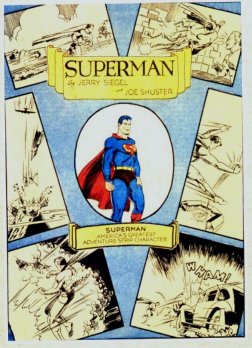| Words
and Pictures
During
World War II Superman regularly outsold Time
magazine. Today New X-Men barely has half the circulation
of Horse Illustrated.
And that's
a damn shame. Especially since there are more good comics
being produced right now than at any other time in the history
of the medium. Not to mention the fact that the comic industry's
"Q" rating is at its highest level in a decade thanks
to mainstream media crossover successes like the Spider-Man
movie and Michael Chabon's Pulitzer Prize-winning novel The
Amazing Adventures of Kavalier and Clay. Yet comics remain
the red-headed stepchild of pop culture and sales, while improving,
are still marginal at best.
What can
comic companies do to rectify this gross injustice? First,
they can get comics out of the direct market ghetto and back
into mass market venues. Then they can finally offer a viable
alternative to the flimsy and overpriced monthly pamphlet.
Thanks
to The Simpsons, the general public's perception of
comic book stores is largely negative. Though to be honest,
the Comic Book Guy is a fairly accurate (if much more erudite)
representation of a large percentage of comic shop owners.
The stores guys like these run - dirty, cramped and inhospitable
to women and children customers - are an impassible barrier
to most fair-weather comic fans. But even the comic stores
that do everything right are facing the prospect of ever-dwindling
sales.
Why? Because
comic stores, like all specialty shops, require a motivated
customer base. The customer has to want to buy a comic before
he ever steps foot in the store. There is no such thing as
the casual comic book store customer. The general public simply
has no reason to go inside a comic store - especially on a
regular basis. Which means that if the direct market and the
comic industry as a whole is going to survive then comics
must return to mass market venues in a big way.
The first
tentative steps in this direction have already been taken
in chain bookstores like Borders and Barnes and Noble. Both
devote prime shelf space to a large selection of graphic novels.
Borders has recently begun stocking monthly comics as well.
This is a good first step, but it doesn't go nearly far enough.
In order
to again break through as a mass medium, comics have to return
to the checkout lines at department stores like Wal-mart (yes,
I know Marvel has a deal for the Ultimate line to be distributed
there but that's a baby step at best). They need to be stocked
along with magazines and paperbacks at the local Walgreens.
There needs to be a section devoted to them at Toys R' Us.
Then and only then will comic industry have the proper environment
in which to recapture the youth market and ensnare older causal
buyers as well.
Distribution
is the primary hurdle the industry must overcome, but there
is also the matter of format. Right now the industry is embracing
the trade paperback in a big way. This is a very good thing,
especially in terms of the book trade. It's easier for media
outlets to review trades and their higher price point makes
book stores willing to devote more shelf space to them. The
process of binding also grants a certain degree of legitimacy.
Grown-ups can read it without feeling self-conscious. It's
a book, not a comic, don't you know.
Wonderful
as they may be, trade paperbacks are still ill-suited for
sale outside bookstores. A mom shopping for detergent at K-Mart
is not going to buy a $15.95 Batman trade for her kid
no matter how much he begs her to. Nor she will be inclined
to spend $2.50 on a flimsy 22 page comic that little Johnny
can finish reading before they're done checking out.
Enter
the digest. The perfect marriage of the trade paperback and
the monthly pamphlet, digests are the perfect format for mass
consumption. Priced competitively with mass market paperbacks,
these mini-trades are cheap enough to be considered a bargain
and substantial enough to provide at least an hour-and-a-half
of solid reading. Not to mention that they're bound and therefore
have much more cultural cachet than a comic. Archie Comics
and various Manga publishers pioneered this format years ago,
but Crossgen has perfected it. Their digest-sized Edge and
Forge compendia weigh in at a hefty192 pages - the equivalent
of eight 22-page comics - but only cost $7.95 apiece. The
reduction in size hasn't affected the quality of the art,
either. The pages don't feel cramped, the lettering is completely
legible and the colors are just as vibrant as in the full-size
editions.
Digests
are the future of mass market distribution and the Big Two
comic companies are woefully behind the curve. The key is
building compendia around the franchise characters: Spider-Man,
Batman, the X-Men, etc. Each of these franchises has at least
two core titles and several ancillary "family" titles
that could form the core of each digest. Mini-series, crossovers
or reprints of classic stories could be used to fill out the
remaining pages. What fan of the Spider-Man movie could resist
a book promising 192 pages of material about ol' webhead for
around half the cost of a CD? Not many, I would think. And
these digests are the perfect "gateway" books. A
well-placed guest appearance or crossover could get a Spider-Man
fan interested in what's happening over in the X-Men titles
or vice-versa. It's cross-marketing at its best.
Spider-Man
was the most successful film of the year and Road to Perdition
is a serious contender for Best Picture. Smallville
is a huge ratings hit for the WB. Graphic novels like Jimmy
Corrigan and Maus have been embraced by the literati
and given the whole medium a much needed injection of cultural
legitimacy. The public wants what comics have to offer. All
the industry has to do is find a better way to give it to
them.
|






